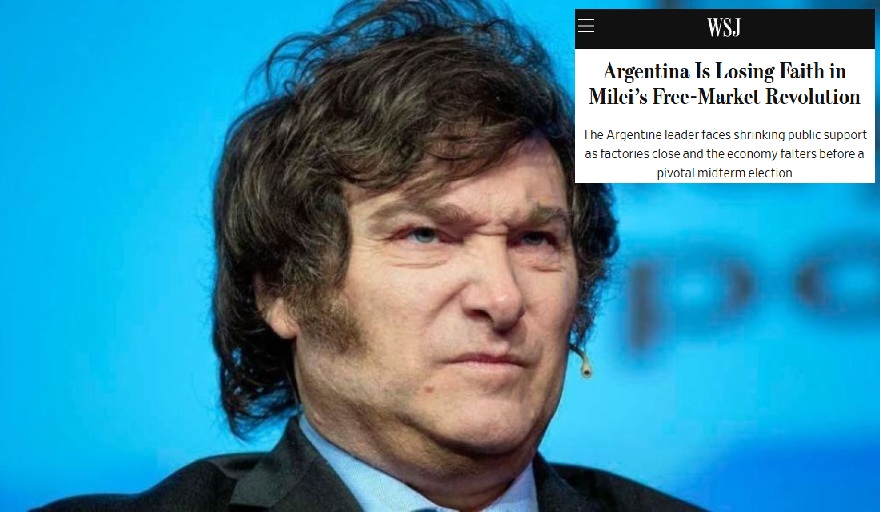
We publish below for the interest of our readers and readers the full article of the Wall Street Journal, where the journalist Ryan Dubé points out “the Argentine leader faces a decrease in public support as factories close and the economy wobbles before a crucial choice of half of the period.”
President Javier Milei received praise from Wall Street and the White House for a free market reform of the weakened Argentine economy. Almost two years later, the promised recovery of its self -styled economic shock therapy is not glimpsed.
The economy is contracting. Tens of thousands of lost jobs during the harsh austerity measures of Milei have not yet recovered. Clothing stores have closed. Retirees and teachers say they do not arrive at the end of the month. Financial markets are hit by growing turbulence.
Marco Meloni says that his small textile factory in Quilmes, on the outskirts of Buenos Aires, is working in half of his capacity, which has forced him to fire a third of his workers. The price of electricity has risen rapidly. With free fall sales, its warehouse is almost overflowing with cloth rolls.
“We don’t sell anything,” said Meloni. “We are in a very vulnerable situation.”
Milei had predicted a V -shaped recovery with the creation of new jobs in a more prosperous and stable economy.
Instead, the economy stagnated, declining in the second quarter compared to the previous three months. Unemployment is 7.6%, compared to 5.7% when Milei assumed the position. And Argentina has about 200,000 jobs since he assumed the position, according to government data.
A possible lifeguard emerged on Monday, when the United States Treasury Secretary Scott Besent said the Trump administration is looking for options to provide Argentina with financial support while Milei struggles to complete its economic reform.
The investors celebrated the news, promoting the actions of the country and raising the weight by 2%. On Tuesday, at the United Nations General Assembly, Milei met with President Trump, who has praised the Argentine leader.
“He has done a fantastic job,” Trump said with Milei. “We support it 100%.”
Milei is attributed to having controlled three -digit inflation after drastically cutting the uncontrolled public spending that he inherited from his leftist predecessor. But their policies have also been painful and are becoming increasingly unpopular after 22 months in office.
Now, Milei faces a crisis just before the legislative elections of mid -mandate next month, which will serve as a referendum about their economic policies. A bad result could ruin its free market experiment in a country overwhelmed by decades of bad economic management.
Investors, formerly optimistic about Milei, are worried. Before the news of American financial aid, Argentine shares and bonds had collapsed in recent weeks. The Central Bank spent more than one billion dollars last week to support weight.
All this is equivalent to a rapid change of course for Milei, a libertarian economist who went from being treated as a rock star in conservative galas in the United States and Europe to deal with worried investors and a growing public anger.
He affirms that the tumult is fed by the “political panic” that began after the elections of early month in the province of Buenos Aires, with a large influx of voters, considered an indicator of the October elections. Milei had predicted a blunt victory, the last nail in the coffin of Peronism, a political movement that bears the name of the former dictator of the country, Juan Perón, and his style of populist economy of state control.
Instead, his party, Freedom Advances, lost by far, what generated concern among investors about the future of his free market reform amid a emboldened opposition.
“The people have risen,” said Axel Kicillof, the ultra -left governor of Buenos Aires, who has become Milei’s main rival. “Millions of Buenos Aires said no to austerity and cruelty.”
The electoral defeat reflected the growing disapproval of Milei in the poorest neighborhoods, where those who once supported their plans to take a chainsaw to the state are losing patience. They have seen jobs disappear, raise transport costs and reduce pensions.
“The charm has been exhausted,” said Reverend Rodrigo Zarazaga, who works in poor neighborhoods of Buenos Aires and directs the Policies Group of the Center for Research and Social Action. “Low income and low -class people don’t tolerate it anymore.”
Support for Milei has fallen to about 40% from about 50% last year, according to surveys. Almost 60% of Argentines believe that the economy is worse now than last year, according to a D’Alessio Irol survey this month.
Carlos Vergara has little hope that the situation will improve soon. Vergara, 52, lost his job three months ago in a metallurgical factory of La Matanza, an industrial city on the outskirts of Buenos Aires. Now struggle to keep your family.
“I can’t support them,” said Vergara. “I have no money”.
In a nearby bakery in La Matanza, some 300 people line up every day to buy bread. Celia Cisneros, the baker, commented that many families do not have 75 cents for a bread bag that is already subsidized by a non -profit local organization. Others tell him that the bread is probably the only thing they eat that day.
“It’s sad,” he said. “People are very concerned about what is happening.”
Milei states that his economic management saved Argentina from the edge of hyperinflation and reduced the poverty of millions of people. It highlights a rise from investments in sectors such as mining, oil and gas.
He says that the worst is already happening, but recognizes that many Argentines have not yet felt the economic benefits.
“We don’t give up, let’s move on,” Milei said in a recent speech. “Is there a long way to go? Yes, but we have achieved a lot.”
Some economists say that Milei was wrong when implementing policies that created an excessively strong peso against the dollar.
After initially devaluating the local currency, the weight quickly strengthened again in real terms after the Central Bank allowed it to depreciate against the dollar at a rate lower than inflation instead of allowing it to float.
The strength of the weight helped reduce inflation, which reached 1.9% in August after reaching almost 26% in December 2023.
But politics had costs, according to economists. The strength of the peso harmed efforts to increase Argentine reserves, necessary to settle its large international debt, including 4.5 billion dollars in bonds called dollars that expire in January. It also reduces export competitiveness.
“Indeed, Argentina is getting disadvantaged itself,” says economist Robin Brooks of Brookings Institution.
The strength of the weight made it cheaper for Argentines to travel abroad, but harmed the local tourism industry.
Vivian Villegas recently closed his beauty hall in Buenos Aires, which attended tourists. He also fired his employees in a small leather jacket store.
“Milei was a stranger and we all bet on him to make a difference,” said Villegas. “But we still don’t notice the change. We don’t know what to do.”
The elimination of commercial barriers by Milei, along with a stronger weight, promoted a boom in imports, from tires and new cars to shoes and t -shirts. Many Argentines buy cheaper imported products in Temu and Shein, the popular Chinese electronic commerce applications.
But industries that require a lot of labor and that politicians covet here, such as construction and manufacturing, have not recovered. Gustavo Murgia has not found work since they fired him at the factory last year.
“I should be working, but what can I do?” He said. “The country is going back.”
Source: www.laizquierdadiario.com

